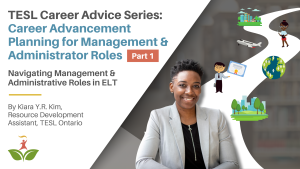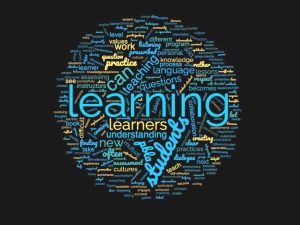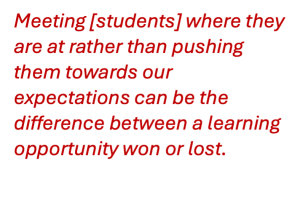I love to teach language learners how to write, from grammar and sentence structure to unity, clarity, and cohesion. As they advance, I ask them to check for rhythm and pacing, delete redundancies, and charge their writing with words that pop from the page into their readers’ imaginations. I show them how to carefully craft their sentences to persuade their audiences. Nothing makes me happier than to see these elements emerge in my students’ papers.
Continue readingEngaging students through art
I have zero talent in drawing or painting. My students giggle as I sketch something on the whiteboard, be it a cat, house, fork, whatever. I channel my creativity in other ways. In online classes, for example, I add artistic flourishes to my class presentations by using colourful and playful designs and animations. And since my students seem to like it, I thought, why not use more visual art to teach the course content?
Continue readingWhen the Moment Calls for Differentiated Instruction
We sometimes forget that learners are at different points along the learning continuum. Our students range from beginning to advanced, and all points in between. While we pitch our lessons to the middle, and expect our students to meet the objectives, the students at the lower end of the continuum tend to get left behind. Yet, these learners present us with the greatest opportunity for teaching and learning in the use of differentiated instruction.
Continue readingHow We Think About Technology in the Classroom

Technology is so embedded in our daily lives that we hardly notice, even take for granted, that we can’t get through our day without our phones, the internet, automated check-outs, Zoom. Yet, when it comes to using computers in the classroom, most teachers are reactionary in their response.
The school where I work will be using Avenue as the main delivery platform for all levels starting in September. This decision, when it was announced last year, did not, and indeed, has not, gone over well with the teachers, to put it mildly.
Continue readingMitigating the Effects of Trauma

“Two of my brothers were killed in the war in Ukraine.”
“My family’s houses were destroyed in Palestine”
“I have PTSD from a trauma in my homeland.”
“There is fighting in my street back home, and I can’t reach anyone.”
“My mother was sent to a re-education centre for being a Uyghur.”
“My husband and I and our two sons were put on a kill list, so we had to flee my country.”
“My sister is sick, and I cannot go back and see her before she dies.”
Continue readingSupporting Literacy Students to Become Independent Learners
I was taking the chairs down from the desks and putting them on the floor before the morning class, when a student came in and said:
“Teacher.”
She shook her head and pointed to herself.
“Me,” she said.
She motioned for me to sit. Since that day, the students have put themselves in charge of the chairs.
Teaching To The Test

I had planned on giving one of my classes a task every Friday. What’s that saying? Ah, yes. Even the best laid plans. . . My plan was running like a well-oiled machine until the final week of classes before the Christmas break. I’d scheduled a writing task on December 15, and the class did it. That was not the problem. Time was. I didn’t have enough of it to cover all the material, and so I decided to teach to the test, or task, as it were.
Continue readingNavigating Management and Administrative Roles in ELT
 Administrative roles are important in the overall management, functioning, and strategic direction of educational institutions. These roles can encompass a wide range of responsibilities that may involve overseeing operations, implementing policies, or managing resources to ensure the overall success of the educational programs and institutions.
Administrative roles are important in the overall management, functioning, and strategic direction of educational institutions. These roles can encompass a wide range of responsibilities that may involve overseeing operations, implementing policies, or managing resources to ensure the overall success of the educational programs and institutions.
Whether you are an educator seeking to broaden your impact on a larger scale, drawn to leadership and mentorship for educators, or motivated for professional growth, embarking on the path from educator to administrator is a journey that demands both ambition and strategic navigation.
In this unique blog series, we explore the pursuit of administrative roles in the field of English Language Training (ELT). TESL Ontario collaborated with six (6) hiring managers representing various sectors of the Ontario ELT landscape, who stand ready to share their experience, advice, and wisdom along this transitional journey. This first installment of the series is designed to introduce you to the available roles and potential pathways into administration.
Continue readingReflections on my practice in the PBLA Prescribed System
 In the LINC/ESL class, instructors “cross barriers of understanding, aptitudes, behaviours, desires, and knowledge” (Rappel, 2013) in hopes of helping newcomers successfully adapt to life in a multicultural community. In this context, I think that Knowle’s five assumptions of andragogy are as useful as ever: clear learning intents and expectation, teacher-student collaboration, student-student collaboration, timely feedback, and engagement in self-reflection.
In the LINC/ESL class, instructors “cross barriers of understanding, aptitudes, behaviours, desires, and knowledge” (Rappel, 2013) in hopes of helping newcomers successfully adapt to life in a multicultural community. In this context, I think that Knowle’s five assumptions of andragogy are as useful as ever: clear learning intents and expectation, teacher-student collaboration, student-student collaboration, timely feedback, and engagement in self-reflection.
I believe these practices can be helpful in creating a learning environment in which students take ownership of learning through mutual respect and co-operation. While these principles are also supported by PBLA guidelines, the application of it brings some challenges as well. Continue reading
Daily Small Talk
As a person and as a language instructor, I hear the words ‘small talk’ and I shudder. However, I have learned – after teaching online for nearly three years now – not to underestimate the opportunities and utility of focusing specifically on Small Talk in class. Focusing on Small Talk has always been successful. When surveyed, learners consistently report that they want more Small Talk rather than less.
I started teaching virtually with a fairly small class (CLB 7) who really responded to Small Talk. For one thing, I found the class needed to deal with mental health issues – near the beginning of COVID – and needed to feel as social as possible in a virtual environment. That’s when I started to develop Small Talk as an integral activity. Most recently, I had a much larger class that also responded very well to the Small Talk activities. This activity is not a one-off lesson but rather focuses on best practices, routine, feedback, and refinement.
Continue reading




